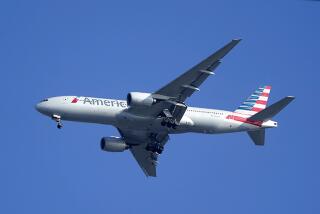U.S. Acts to Ban Airlinesâ Fixing of Overseas Fares
WASHINGTON â In a major policy shift, the Justice Department Tuesday recommended a ban on U.S. airlinesâ longstanding practice of fixing prices on international fares--an action that could deal a major blow to the international cartel that sets ticket prices.
The department, in a filing with the Transportation Department, recommended removing blanket antitrust immunity under which U.S. carriers have worked with the International Air Transport Assn. to set overseas fares.
âMany Americans may not realize that the prices of their airline tickets for travel abroad are set by what is in effect a legalized international cartel,â Atty. Gen Dick Thornburgh said. âLower fares and better service are what we seek.â
The Justice Department also proposed that transportation officials evaluate whether antitrust immunity is justified for foreign carriers whose tickets are purchased in the United States. The IATA also sets fares for most foreign airlines, although IATA claims that airlines are free to ignore their guidelines.
But even if a price-fixing ban was limited to U.S. carriers, such a move could set off a price war that would affect foreign airlines operating out of U.S. airports. The State Department is understood to have resisted the surprise move because it may offend foreign governments.
Transportation officials have been critical of IATA fare-setting practices in the past, heightening the prospects that they will accept the Justice Departmentâs legal advice.
The recommendations issued Tuesday focused primarily on U.S. carriers as the Transportation Department was asked to order IATA âto show cause why approval and antitrust immunity should not be withdrawn for anti-competitive IATA agreements on fares charged by U.S. airlinesâ for international tickets bought in the United States.
âSuch agreements are contrary to fundamental U.S. competitive policy as set forth in the antitrust laws,â James F. Rill, assistant attorney general for antitrust, said in the filing.
A senior U.S. airline official, declining to have his name or company identified, said that the Justice Department recommendation, if adopted, âwould be quite injurious to us.â
In addition to cutting into the airlinesâ profits, the abandonment of IATA rate-setting could draw objections from countries already angered by U.S. attempts to force other standards on foreign airlines, the executive said.
Efforts to reach IATA officials, both in Washington and abroad, were unsuccessful.
Regarding foreign carriers, Justice officials proposed that the Transportation Department also consider on a country-by-country basis whether âinternational comity considerations,â or respect for other nationâs laws, justify giving antitrust immunity to IATA agreements that fix fares in which U.S. interests are strong.
As examples, it cited fares for travel on foreign carriers to and from the United States, and for travel between foreign countries on tickets bought in the United States.
âWith so many of the countries of the world now recognizing the benefits of competitive free-market economies,â Thornburgh said in a statement issued with the filing, âwe should not continue to grant blanket immunity to a multilateral cartel, but should address the needs and concerns of individual foreign governments on a case-by-case basis.â
Antitrust immunity for the rate agreements dates back to 1946, when the Civil Aeronautics Board, a predecessor agency to the Transportation Department, granted it to IATA participants. The immunity remained unchallenged until 1978, when the board issued an order for the IATA to show cause why it should not be withdrawn.
After hearings and study that lasted 2 1/2 years, the board concluded that the tariff practices were âinherently anti-competitive.â Moreover, in 1985, the Transportation Department reaffirmed the finding that the IATA rate-setting âsubstantially reduces competition.â
But the practices continued with âno significant changes,â the Justice Department said.
The Justice Department on Tuesday rejected IATAâs defense of the practice, including the argument that the association lacks the ability to compel its members to follow its rate agreements. This âat most reduces their effectiveness to that of a typical domestic price-fixing conspiracy,â the department said.
âEven if the agreed-upon price levels are not uniformly adhered to, those levels can be used by individual carriers as a reference point,â the department said. âWhatever the ultimate price level, it is higher than that which would exist under a competitive regime.â
In arguing for removing the antitrust exemption, Justice Department lawyers contended that consumers have benefited from the 1981 deregulation of U.S. airlines. After adjusting for inflation, air fares dropped 26% between 1981 and 1988, they said, citing a Transportation Department study.
More to Read
Sign up for Essential California
The most important California stories and recommendations in your inbox every morning.
You may occasionally receive promotional content from the Los Angeles Times.










